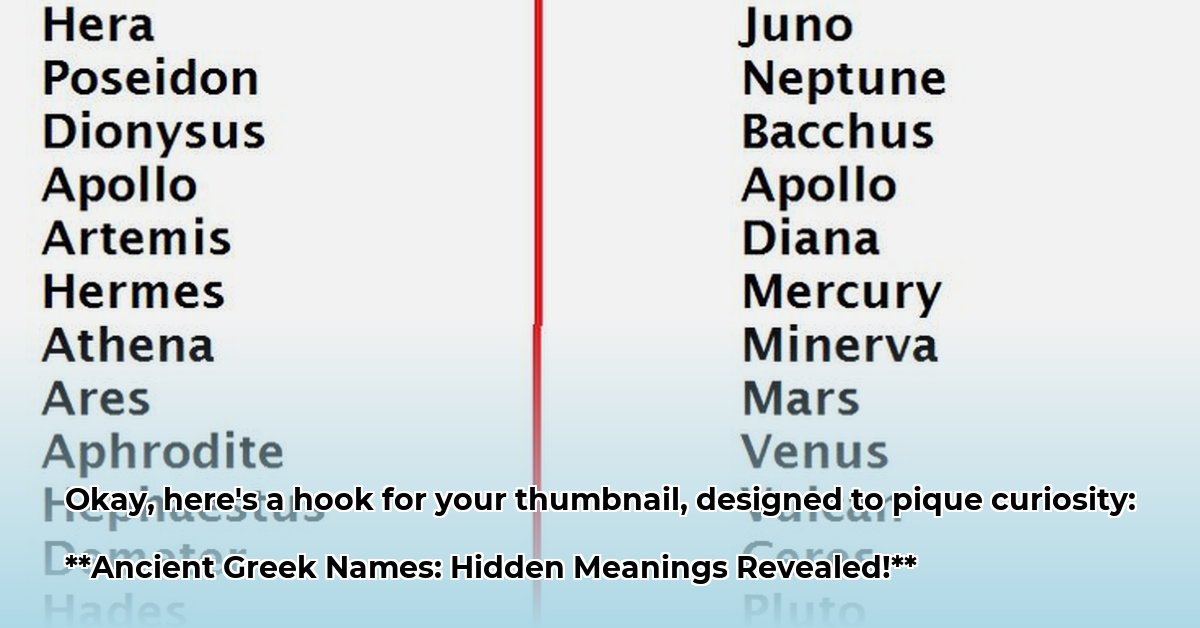Ever wondered why certain names resonate with an almost ancient power, echoing tales of heroes and thinkers? This journey delves into the magnificent world of Ancient Greek names, revealing that they were far more than simple labels. They were meticulously chosen, imbued with profound meaning, and served as powerful reflections of the values and virtues cherished by an extraordinary civilization. In this comprehensive exploration, we will move beyond mere lists, peeling back layers to uncover the captivating stories woven into their very fabric. We will meticulously examine their construction, their distinct significance for men versus women, how they adapted through the ages, and, perhaps most intriguing, why their timeless allure continues to captivate us today. For inspiration, explore a curated list of female names. Moreover, this guide offers insightful tips for navigating the rich tapestry of Ancient Greek names, whether you are considering one for a new arrival, a compelling fictional character, or simply indulging a burgeoning curiosity. Prepare for an enthralling journey back in time, to an era where names transcended simple identification, serving instead as profound windows into the very soul of Hellenic society.
Ancient Greek Nomenclature: A Deep Dive into Meaning and Structure
Have you ever paused to truly consider the hidden narratives within a name? In the vibrant tapestry of ancient Greece, a name held significantly more weight than a mere identifier; it was a deliberately chosen echo of aspirations, a subtle declaration of societal values, and a testament to linguistic ingenuity. Let us now embark on a captivating journey to unravel the fascinating world of ancient Greek names and discover the enduring linguistic insights they continue to offer.
Names: A Mirror to Desired Qualities
Imagine the foresight required to select a title that inherently embodied your deepest ambitions. The Hellenes, as the ancient Greeks referred to themselves, possessed precisely this discerning power. Names were not randomly assigned; rather, they resonated with specific virtues and character traits that individuals and their families ardently wished to cultivate. Consider “Alexander,” for instance, translating literally to “defender of men.” This evokes an immediate sense of formidable strength and steadfast protection, qualities held in high esteem within their often-perilous society. Similarly, “Sophia,” meaning “wisdom,” and “Arete,” signifying “virtue” or “excellence,” were chosen with the clear intention of nurturing these desirable attributes in their young bearers. Even a name like “Agathokles,” which elegantly combines “good” (ἀγαθός, agathos) and “glory” (κλέος, kleos), underscored the profound significance of ethical conduct and renown. This highlights the depth of thought and intention that permeated the act of naming, emphasizing traits like valor, truth, and civic duty.
The Anatomy of a Greek Name: Linguistic Architecture
For a deeper understanding of classical Greek nomenclature, we must analyze its linguistic architecture. The construction of ancient Greek names often involved combining distinct semantic elements: root words, prefixes, and suffixes. These components were not arbitrary additions; they were sophisticated linguistic tools that meticulously added layers of meaning, transforming a simple collection of sounds into a potent statement of identity and purpose.
- Root Words: These formed the core meaning. For example, hippos (ἵππος) meaning “horse” appears in names like Hippocrates (“horse power”) or Philippos (“lover of horses”). Demos (δῆμος) meaning “people” forms the root for Demetrius (“devoted to Demeter,” referring to the goddess of agriculture, patron of the common people) and Democritus (“chosen of the people”).
- Prefixes: Often indicating opposition, intensity, or origin. Aná (ἀνά), meaning “up” or “back,” appears in “Anastasius” (“resurrection”). Anti (ἀντί), meaning “against” or “like,” is found in “Antigonus” (“opponent” or “like his father/ancestor”) and “Antipater” (“like the father”).
- Suffixes: As previously mentioned, suffixes played a vital role in shaping a name’s overall significance.
- -andros (derived from ἀνήρ, aner, “man,” genitive ἀνδρός, andros): Powerfully communicated the essence of being a “man” or “defender of men,” as prominently featured in “Alexandros” (Ἀλέξανδρος).
- -kles (from κλέος, kleos, “glory”): Eloquently denoted “glory,” found in illustrious names such as “Pericles” (Περικλῆς, “surrounded by glory”) and “Sophocles” (Σοφοκλῆς, “wise glory”).
- -os/-us (masculine endings) and -a/-e (feminine endings): These grammatical suffixes helped distinguish gender, though the core meaning remained. For instance, “Alexander” (Ἀλέξανδρος) and “Alexandra” (Ἀλεξάνδρα) share the same root meaning but are gendered through their endings.
Furthermore, the very “blueprint” of a Greek individual’s full name often extended beyond a single given name. Ancient Greeks commonly employed a three-part harmony that provided comprehensive cultural identity and social context:
- Given Name (ὄνομα, onoma): The primary identifier, selected for its meaning or connection.
- Patronymic (πατρωνυμικόν, patronymikon): Signified “son/daughter of…” (e.g., “Alexandros, son of Philippos”). This was crucial for establishing lineage and distinguishing individuals with common given names.
- Demotic (δῆμος, demos, “people/district”): Indicated one’s place of origin or the administrative district (deme) one belonged to (e.g., “Pericles of Athens,” referring to his deme, Cholargos). This intricate system painted a vivid picture of an individual’s place within society and their geographical roots, providing a robust identity for civic participation and social recognition.
Evolving Traditions: Gender, Influence, and the Test of Time
Greek naming conventions were not static. Much like the ebb and flow of tides, they gracefully adapted and transformed over vast stretches of time, reflecting profound societal shifts and cultural intermingling. The very act of naming provides a clear window into a civilization’s evolution, showcasing its resilience and capacity for cultural adaptation.
Distinct Conventions for Male and Female Names
What were the discernible distinctions between male and female names in the classical era? Generally speaking, male given names often celebrated qualities such as strength, leadership, and prowess, particularly in areas like battle or governance. Names like “Pericles” (meaning “surrounded by glory,” a fitting name for the statesman who led Athens during its Golden Age) or “Leonidas” (meaning “son of a lion,” epitomizing the Spartan king renowned for his courage at Thermopylae) exemplify this focus on heroic and civic virtues. These names were intended to inspire and reflect aspirational roles within the polis.
In stark contrast, female names frequently emphasized beauty, grace, and virtues often associated with the domestic sphere, fertility, or artistic expression. Consider “Thalia” (meaning “to flourish” or “bloom,” often associated with the muse of comedy and idyllic poetry) or “Kalliope” (meaning “beautiful voice,” linked to the muse of epic poetry and eloquence). The name “Aspasia” (Ἀσπασία), meaning “welcome” or “embrace,” was borne by the influential companion of Pericles, highlighting intellectual and social grace. While some names could be adapted across genders or carried broader cultural significance that overrode strict gendered meaning (e.g., “Alexis,” meaning “helper” or “defender,” used for both men and women), the general trend emphasized gendered virtues. The connection to nature, such as “Chloe” (meaning “green shoot”) or “Daphne” (“laurel tree”), was also a common theme for feminine names, symbolizing growth, beauty, and resilience.
Cultural Shifts and Enduring Legacies
The ascent of Christianity, as one might anticipate, profoundly influenced ancient Greek naming practices. This brought about a gradual, yet significant, adoption of biblical names, demonstrating a palpable shift in religious devotion. Names like “Tobias” (from Hebrew, “Yahweh is good”) and “Elias” (from Hebrew, “My God is Yahweh”) became increasingly common, signaling the integration of new spiritual identities. This transition layered Christian meanings over the classical Greek traditions.
Furthermore, the dynamic interactions with other civilizations, particularly the burgeoning Roman Empire, left an indelible mark. This introduced foreign elements and reflected the profound interconnectedness of the ancient world. Many older Greek names continued to be used, sometimes Latinized (e.g., “Achilles” from “Achilleus”), and new names emerged reflecting syncretism. The prestige associated with Roman power led to some crossover in naming trends. Despite these influences, many original Greek names endured due to their inherent strength and beauty, forming a continuous linguistic evolution. For instance, names derived from revered philosophers (Plato, Aristotle) or mythological figures (Apollo, Artemis) continued to be used, symbolizing a deep respect for the intellectual and cultural heritage. The presence of names like “Athanasios” (meaning “immortal”), a prominent early Church father, neatly illustrates the fusion of Greek linguistic roots with Christian theological concepts, marking an important enduring legacy.
The Resurgence of Ancient Greek Names in the Modern Era
Here’s a delightful twist that might just pique your interest: ancient Greek names are experiencing a remarkable renaissance in the modern world. This isn’t merely a fleeting fad; it indicates a profound and renewed fascination with classical history and the rich tapestry of Greek mythology. This resurgence truly underscores the timeless appeal of names imbued with profound meaning and a storied past.
A Timeless Appeal Rooted in Heritage
Names such as “Penelope” (a patient and clever figure from Homer’s Odyssey), “Atlas” (the Titan who held up the sky), and “Calliope” (the muse of epic poetry) are enjoying escalating popularity. This signals a deep appreciation for their historical weight and melodic cadence. This resurgence isn’t just about sounding unique; it speaks to a deeper desire for names that possess gravitas, connect to a rich heritage, and offer a sense of identity rooted in powerful narratives. For many, choosing an ancient Greek name is a conscious decision to embrace strength, wisdom, or a tangible connection to a cultured lineage. The enduring power of a name, especially one steeped in such antiquity, truly speaks volumes about its inherent semantic depth and the human desire for meaningful identity.
Mythological, Stellar, and Philosophical Trends
What’s particularly trending within the landscape of modern Greek naming? There’s a notable inclination towards unique and meaningful choices, often drawing directly from mythology, celestial bodies, and philosophical traditions. Names like “Selene,” meaning “moon” (from the goddess of the moon), or “Asterios” and “Astraia,” signifying “starry” (from ἀστήρ, aster for star), tap into a more spiritual and ethereal dimension, offering names that are both rare and deeply resonant. The philosophical tradition also inspires, with names like “Plato” or “Socrates” making occasional appearances, signifying intellectual aspiration. It’s a testament to the fact that compelling names, much like enduring stories, possess a remarkable capacity to transcend centuries and continue their captivating journey, finding new life in contemporary contexts.
| Name | Meaning | Origin | Cultural Connection |
|---|---|---|---|
| Alexander | Defender of mankind | Greek | Name of Alexander the Great, symbolizing powerful leadership and defense. |
| Sophia | Wisdom | Greek | A virtue highly esteemed in Greek philosophy; borne by early saints. |
| Theodore | Gift of God | Greek | Common in Christian tradition, reflecting divine blessing. |
| Penelope | Weaver | Greek | From Homer’s Odyssey, symbolizing loyalty, patience, and domestic virtue. |
| Anastasia | Resurrection | Greek | Popular in Orthodox Christian culture, denoting rebirth and renewal. |
| Pericles | Surrounded by glory | Greek | Name of the Athenian statesman, embodying political prowess and civic achievement. |
| Cassandra | Shining upon men, prophetess | Greek | From Greek mythology, a figure of tragic foresight. |
| Achilles | Pain, distress (or unknown) | Greek | The central hero of Homer’s Iliad, representing unparalleled warrior strength and vulnerability. |
| Iris | Rainbow, messenger | Greek | From the goddess of the rainbow and messenger of the gods, symbolizing beauty and connection. |
| Orion | Hunter (or rising in the sky) | Greek | A giant hunter in Greek mythology, now a prominent constellation, suggesting strength and celestial connection. |
Ultimately, the study of ancient Greek names offers a truly captivating window into the culture, beliefs, and remarkable linguistic creativity of the ancient world. These names were far more than labels; they were intricately crafted reflections of hopes, deeply held values, and grand aspirations. Their continued appeal in modern times speaks volumes about the timeless potency of a meaningful moniker and the enduring power of classical Greek culture.
Choosing Your Own Ancient Greek Name: A Practical Guide
Key Takeaways:
- Ancient Greek names offer a profound connection to heritage and a unique identity.
- These names reflect deep cultural values, familial lineage, and specific geographical origins.
- Careful consideration of pronunciation and historical context is crucial for authenticity and resonance.
- Modern usage often connects to the symbolic meaning and rich family history embedded within these names.
- Researching regional naming patterns and consulting experts can provide deeper understanding and personal resonance.
Decoding the Essence of Ancient Greek Names
Have you ever truly pondered the profound weight a name carries? In the illustrious realm of ancient Greece, a name held immeasurable significance. Far from being a mere label, it served as a veritable window into a person’s character, their lineage, and even, some might argue, their very destiny. These names echoed with virtues, resonated with devotion, and encapsulated the very essence of the world that surrounded their bearers. This enduring tradition, steeped deeply in mythology and a rich classical history, continues to resonate with powerful clarity even today. Each name was chosen with meticulous care, ensuring it was a reflection of the qualities parents hoped their children would embody, integrating them into the fabric of their community and the wider Hellenic world.
The Blueprint of a Greek Name: Identity Beyond the Given
Imagine the intricate branches of a family tree, each one geographically rooted. Ancient Greek names were rarely singular; instead, they often formed a complete, multi-faceted picture that articulated an individual’s place within society. This “full name” structure provided more than just identification; it conveyed social standing, lineage, and geographical affiliation. This sophisticated system painted a remarkably vivid image of an individual’s distinct place within the complex fabric of society, providing a comprehensive identity that transcended a simple label and fostered a strong sense of cultural identity.
Navigating Influences: Mythology, History, and Geography
The vibrant tapestry of Greek mythology, the lives of revered historical figures, and even the very contours of the landscape all played pivotal roles in shaping naming conventions. Names often mirrored the heroic tales of gods and legendary heroes, imbuing their bearers with an almost immediate sense of grand narrative and aspirational qualities. The glorious deeds of Alexander or the philosophical depth of Aristotle provided templates for names that echoed greatness. Simultaneously, geographical surroundings themselves frequently inspired choices, solidifying the profound connection between the people and their environment. For instance, names derived from cities like Corinth or regions like Arcadia (Arcadius) celebrated one’s origin. This rich interplay of elements ensured that each name was not just a sound, but a story in itself, a micro-narrative of a person’s place in the cosmos and society.
Step-by-Step Guide: Choosing Ancient Greek Names Today
So, you find yourself on the intriguing hunt for that perfectly resonant, Greek-inspired name? Here is your Step-by-Step Guide for Choosing Ancient Greek Names Today, designed to help you navigate this rewarding journey with confidence and insight:
- Dive into the Meaning and Etymology: Do not simply select a name based on its pleasing sound. Explore its profound meaning and delve into its rich historical context. What specific virtues or aspirations does it genuinely represent? Does it connect deeply with your family heritage or personal values? Understanding the etymology – the linguistic root and evolution of the word – is paramount for an informed choice.
- Consider Pronunciation and Flow: Be aware that Greek names, while beautiful, can sometimes be linguistically complex for modern English speakers. Sound the name out loud repeatedly. Ensure it flows effortlessly off the tongue and is comfortably easy for others to pronounce and remember without difficulty. Practice with different accents to confirm its universal appeal.
- Explore Regional Variations and Historical Context: Be mindful that naming patterns often differed significantly across various regions of ancient Greece. Delve into your family genealogy if possible; you might uncover specific regional naming preferences that could subtly influence your ideal choice. Researching the historical periods (Archaic, Classical, Hellenistic) can also provide further nuanced options.
- Adapt and Personalize Thoughtfully: Feel entirely free to subtly adapt a classical name to beautifully reflect a child’s unique personality or your own creative vision. For example, a shortened form or a slight spelling alteration can honor the original while making it feel contemporary. The inherent beauty of language lies precisely in its remarkable adaptability and capacity for personal expression, allowing for a blend of historical depth and modern appeal without losing the core symbolic meaning.
- Consult Reliable Resources and Experts: Should you wish to delve even deeper into the intricacies, consider consulting reputable linguistic or historical authorities, and academic databases. They can provide invaluable insights into rare names, accurate etymologies, and the precise cultural significance of each option, ensuring your choice is both culturally sensitive and historically informed.
The enduring allure of ancient Greek names undeniably lies in their timeless quality. They encapsulate wisdom, embody strength, and resonate with a profound cultural identity that continues to captivate us today. When you choose an ancient Greek name, you are doing far more than simply selecting a label; you are consciously embracing a rich and magnificent enduring legacy that has journeyed across millennia, a name that tells a story and carries the echoes of an extraordinary past.
- Unearth ancient rome achievements: Engineering feats & legal legacies, examined - August 13, 2025
- Unlock ancient rome army ranks: Power, impact & legion command - August 13, 2025
- Conquer Your Exam: Ancient Greece Quiz Ace It Now! - August 13, 2025
















